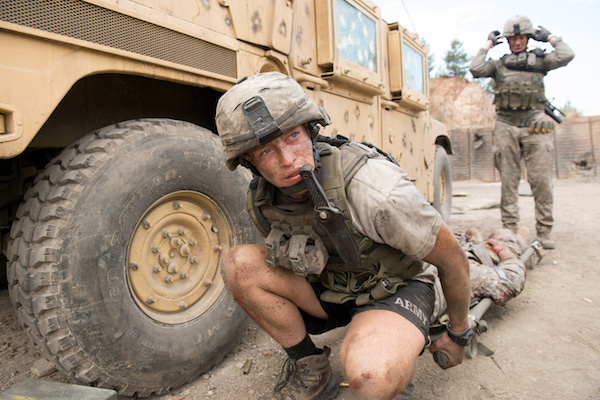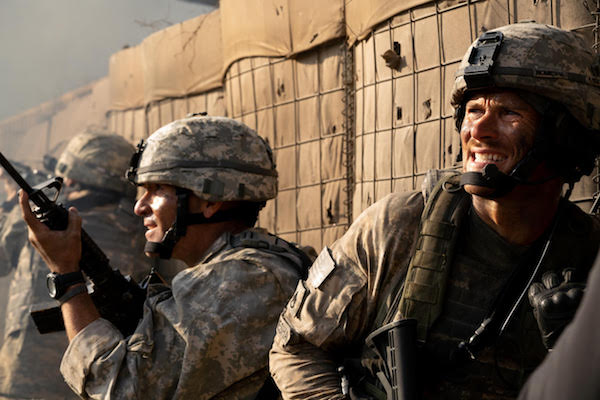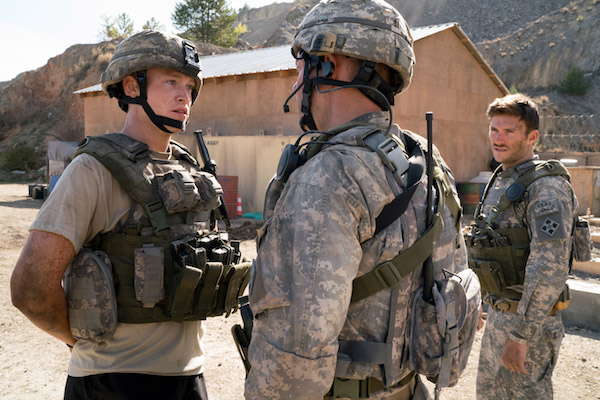An intense account of a harrowing Taliban attack in 2003, The Outpost treats its characters with reverence. Adapting Jake Tapper’s nonfiction book The Outpost: An Untold Story of American Valor, director Rod Lurie aims for authenticity as well, adding some real-life participants to the cast and crew. It’s a big, ambitious film that would have had more impact in theaters. Screen Media is offering it for streaming starting July 3.

Stationed at the indefensible Combat Outpost Keating, the soldiers of Bravo Troop (mostly Americans, with some ineffective locals undergoing training) have been overlooked by the brass. Ringed by mountains, the outpost is a sitting duck for snipers. With no defined mission, the best the soldiers can hope for is to survive until they are called home.
Lurie and DP Lorenzo Senatore use long takes and handheld cameras to immerse viewers into the tense, gritty, day-to-day life at the camp. Characters are introduced on the fly as the plan of the camp becomes clear: ammo depot, generator, command center, barracks, woefully under-equipped clinic. That camp schematic will become crucial later on.
The troops range from by-the-book to hapless, like Specialist Ty Michael Carter (Caleb Landry Jones), who’s usually wearing shorts and getting high. Staff Sergeant Clint Romesha (Scott Eastwood) is a different kind of soldier, one who understands strategy, doesn’t underestimate his opponents, and tries to plan ahead. 1st Lieutenant Benjamin Keating (Orlando Bloom) has won the admiration of both his men and the locals by putting his life and beliefs on the line.

For its first hour, The Outpost is nearly indistinguishable from mainstream war movies based on real-life incidents. We Were Soldiers, Hacksaw Ridge, Lone Survivor — their soldiers may be brave or weak, gung ho or skeptical, stoned or not, but they do their duty. It doesn’t matter what their orders are, the only issue is whether they can survive.
The movie ostensibly steers clear of politics, apart from the soldiers’ contempt for brass and veiled references to an upcoming election. But war movies by definition are political. In The Outpost Lurie chooses not to address the issues that drive films like All Quiet on the Western Front, Paths of Glory, American Sniper. As in Peter Berg’s case, not taking a stand says a lot.
Plotting in the first hour is episodic in the extreme. Soldiers go on tour, meet with villagers, react to snipers. Incidents erupt like clockwork. Cross a bridge, it will blow up. Drive along a mountain ridge, your truck will crash. Like a World War II movie, casualties seem to be tied to billing, to what the soldiers reveal about themselves, the way they’re framed.
In the second hour, Lurie and crew stage a re-enactment of the “Battle of Kamdesh” from October 3, 2009, when an estimated 400 fighters stormed the 53 Americans guarding the outpost. Here the movie comes into sharp focus, the jittery camerawork and extended takes bringing viewers directly into the action.

It’s an incredible technical accomplishment, one that captures the shock and fear of battle. And it’s here that Caleb Landry Jones does exceptional work. Wounded, gasping for breath, his eyes bulging, he makes a compelling Carter. Scott Eastwood is impressive as well, although more along Hollywood hero lines. The battle sequence is so rousing, so engrossing, that you may not remember how thin and clunky the opening hour was.


